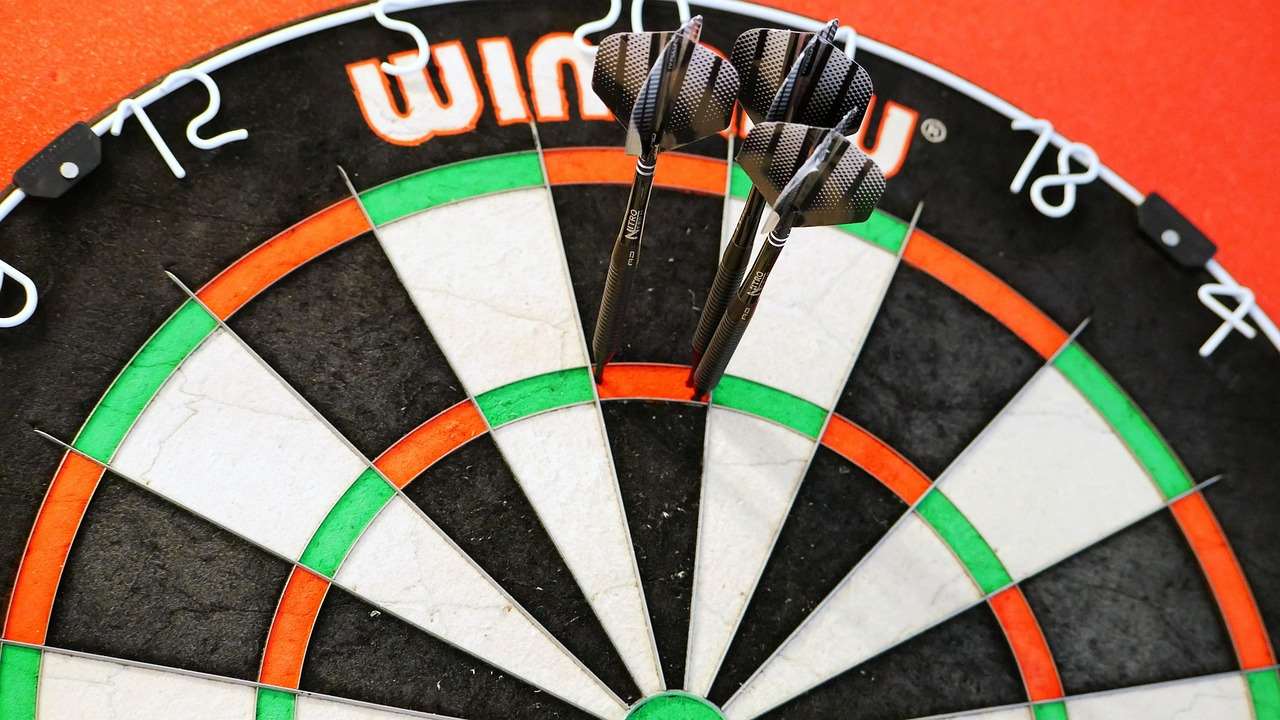Navigating the legal landscape of fantasy darts requires understanding the specific regulations surrounding skill-based games and gambling; essentially, if your fantasy darts league involves entry fees and cash prizes, you need Fantasy Darts Legal Advice to ensure compliance. This article breaks down the key legal considerations, focusing on avoiding potential issues and keeping your league above board, covering everything from gambling laws to terms and conditions.
⚠️ Still Using Pen & Paper (or a Chalkboard)?! ⚠️
Step into the future! The Dart Counter App handles all the scoring, suggests checkouts, and tracks your stats automatically. It's easier than you think!
Try the Smart Dart Counter App FREE!Ready for an upgrade? Click above!
Understanding Gambling Laws and Fantasy Darts
One of the primary concerns when running a fantasy darts league is whether it constitutes illegal gambling. The definition of gambling varies depending on location, but it typically involves three elements: consideration (an entry fee), chance (an unpredictable outcome), and a prize. Fantasy darts leagues often involve entry fees and prizes, so the key question is whether skill or chance predominates.
If success in your league is largely determined by skill – such as the ability to analyze dart player form statistics, predict player performance, and strategically manage a team – it’s more likely to be considered a game of skill rather than gambling. However, even in skill-based games, an element of chance will always be present (e.g., an unexpected injury to a key player). Therefore, understanding how your jurisdiction defines skill versus chance is crucial. Always seek specific Fantasy Darts Legal Advice.
Key considerations for minimizing the risk of being classified as gambling include:
- Emphasizing skill: Structure your league to reward strategic decision-making, in-depth knowledge of darts, and accurate player predictions.
- Transparency: Clearly outline the rules of the league and the criteria for winning.
- Legal consultation: Consult with a legal professional to ensure compliance with local laws.

The Role of Skill vs. Chance in Fantasy Sports
The distinction between skill and chance is central to the legality of fantasy sports, including fantasy darts. Games of skill are generally permissible, whereas games of chance are often subject to stricter regulations. Courts often consider several factors when determining whether skill predominates, including:
- The information available to participants: Is there sufficient data available to make informed decisions, or is it largely guesswork?
- The experience of participants: Do experienced players consistently outperform less experienced players?
- The degree of control participants have: Can participants actively manage their teams and adapt to changing circumstances?
When designing your fantasy darts league, prioritize features that highlight skill and minimize the impact of pure luck. For example, you might consider implementing a trade system that allows players to improve their teams or adding bonus points for accurately predicting match outcomes.
Drafting Clear Terms and Conditions
Well-drafted terms and conditions are essential for any fantasy darts league. These terms should outline the rules of the game, the eligibility requirements for participation, the prize structure, and the procedures for resolving disputes. They should also include disclaimers regarding liability and intellectual property rights.
Essential elements of terms and conditions include:
- Eligibility: Clearly define who is eligible to participate in the league (e.g., age restrictions, residency requirements).
- Entry fees and prizes: Specify the entry fee amount, the prize pool distribution, and the payment methods accepted.
- Rules of the game: Detail the scoring system, the drafting process, the trade rules, and any other relevant gameplay rules.
- Dispute resolution: Establish a clear process for resolving disputes between participants or between participants and the league administrator.
- Liability disclaimer: Include a disclaimer stating that the league administrator is not responsible for any losses or damages incurred by participants.
- Intellectual property: Address ownership of content created by participants, such as team names and forum posts.
Make sure your terms and conditions are written in plain language that is easy for participants to understand. Consider consulting with legal counsel to ensure that your terms and conditions are legally sound and enforceable. It’s all part of getting solid Fantasy Darts Legal Advice.

Advertising and Promotion Regulations
When advertising your fantasy darts league, be mindful of advertising regulations, particularly those related to gambling. Avoid making any claims that could be interpreted as promoting gambling or targeting vulnerable individuals. Be transparent about the skill-based nature of your league and avoid exaggerating the potential for financial gain. The best Fantasy Darts Legal Advice will include this consideration.
Consider these guidelines when advertising your league:
- Avoid gambling-related language: Refrain from using terms like “betting,” “wagering,” or “gambling” in your advertising materials.
- Emphasize skill: Highlight the strategic elements of the game and the importance of dart player knowledge.
- Be truthful: Avoid making misleading or exaggerated claims about the potential for winning.
- Target appropriately: Ensure that your advertising reaches an audience that is likely to be interested in fantasy darts and is not considered vulnerable.
Data Privacy and Compliance
Collecting and using personal data from participants in your fantasy darts league requires compliance with data privacy laws, such as the General Data Protection Regulation (GDPR) in Europe and similar regulations in other jurisdictions. Obtain explicit consent from participants before collecting their data, and be transparent about how their data will be used. Implement appropriate security measures to protect personal data from unauthorized access or disclosure. Consult with a legal expert specializing in data privacy to ensure compliance.
Prize Structures and Tax Implications
The structure of your prize pool can also have legal implications. For example, some jurisdictions may have specific regulations regarding the maximum prize amount that can be awarded in a skill-based competition. Additionally, prize winnings may be subject to income tax. Consult with a tax professional to determine the tax implications of your prize structure and ensure compliance with all applicable tax laws. You may require Fantasy Darts Legal Advice to understand all your responsibilities here.

Consider these points regarding prize structures:
- Compliance with regulations: Ensure that your prize structure complies with any local or national regulations regarding prize amounts in skill-based competitions.
- Tax obligations: Understand the tax implications of prize winnings and provide participants with the necessary tax documentation.
- Transparency: Clearly communicate the prize structure to participants and ensure that it is fair and equitable.
Mini Fantasy Darts and Legality
Even smaller, quicker versions of fantasy darts must still adhere to the same legal principles. The key is ensuring that skill still predominates even within a shorter timeframe or limited selection of players. These smaller leagues are still subject to the relevant gambling laws and advertising regulations.
Intellectual Property Considerations
Be mindful of intellectual property rights when operating a fantasy darts league. Avoid using trademarks or copyrighted material without permission. If you plan to use dart player names or likenesses in your league, ensure that you have the necessary rights or licenses. If you create original content for your league, such as logos or website designs, protect your intellectual property by registering trademarks or copyrights. It’s prudent to seek Fantasy Darts Legal Advice in this area.

It’s important to consider how to analyze dart player form and how that data may be used and distributed within your league. Remember you must have the right to use and share the data that you are analyzing. Also remember Darts Betting And Fantasy Leagues Guide may also be helpful when developing your league.
Seeking Legal Counsel
The information provided in this article is for informational purposes only and does not constitute legal advice. The legal landscape surrounding fantasy darts is complex and can vary depending on your location. It’s always best to consult with a qualified attorney to obtain personalized legal advice regarding your specific situation.
A lawyer can help you:
- Assess the legality of your fantasy darts league in your jurisdiction.
- Draft clear and comprehensive terms and conditions.
- Ensure compliance with advertising regulations and data privacy laws.
- Navigate intellectual property issues.
- Resolve disputes with participants or regulators.

Conclusion
Running a fantasy darts league can be a fun and rewarding experience, but it’s essential to be aware of the legal considerations involved. By understanding gambling laws, drafting clear terms and conditions, complying with advertising regulations, and seeking legal counsel when necessary, you can minimize the risk of legal issues and ensure that your league operates within the bounds of the law. Remember, focusing on skill, maintaining transparency, and prioritizing data privacy are crucial elements of a successful and legally compliant fantasy darts league. Before you launch your league, ensure you’ve considered all aspects of Fantasy Darts Legal Advice. If you’re ready to start planning, ensure you consult with a legal expert to get started on the right foot.
Hi, I’m Dieter, and I created Dartcounter (Dartcounterapp.com). My motivation wasn’t being a darts expert – quite the opposite! When I first started playing, I loved the game but found keeping accurate scores and tracking stats difficult and distracting.
I figured I couldn’t be the only one struggling with this. So, I decided to build a solution: an easy-to-use application that everyone, no matter their experience level, could use to manage scoring effortlessly.
My goal for Dartcounter was simple: let the app handle the numbers – the scoring, the averages, the stats, even checkout suggestions – so players could focus purely on their throw and enjoying the game. It began as a way to solve my own beginner’s problem, and I’m thrilled it has grown into a helpful tool for the wider darts community.